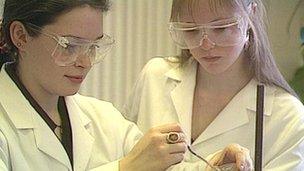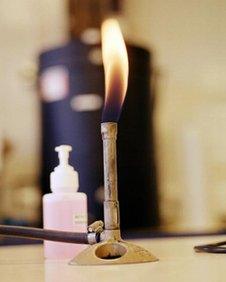MPs anger as science proposals are 'rejected'
- Published

MPs said all pupils should have the chance to do science experiments
MPs have described ministers' response to their recommendations on science lessons as "hugely disappointing".
The report, published in September by the Commons Science Committee, said all pupils should have the chance to do experiments and field work in school.
The government agreed, but said the national curriculum should not dictate the detail of science teaching.
The committee accused the government of not dealing with the issue of poor practical science lessons.
Chair of the committee Andrew Miller said: "It is hugely disappointing that on such an important issue as this - inspiring the next generation of scientists - the government has failed to accept many of the recommendations in our report.
"We must make science an exciting subject to study and an obvious route to future employment - the government agrees with this but has failed to show us how it will address the poor practical science experiences of many students."
The report, by the cross-party group of MPs, said experiments in science lessons varied from the excellent to dull or non-existent.
The MPs called for a central facility of details and guidance on standard science experiments.
The committee also wanted exam boards to require a field work component to science courses and to assess students' practical skills.
The report also called for better career development for technicians and for Ofsted to report on training opportunities for science teachers.
But the government says it is up to teachers to decide which experiments to do and which resources they need.

The government says teachers should choose which experiments to do
A spokesman for the Department for Education said the science curriculum was being revised.
"Science is key to our economic future," the spokesman said.
"That's why we are overhauling the science curriculum, freeing up teachers to be more creative in the classroom, such as with experiments."
Physics teachers
Meanwhile figures from the Training and Development Agency for Schools suggest efforts to tackle shortages of teachers in certain subjects are paying off with more physics teachers in training since 1979.
This academic year 864 people are training to become physics specialists - up 30% on 2010.
Professor Peter Main, director of education and science at the Institute of Physics, said a separate target for the recruitment of physics teachers, distinct from science teachers, had helped.
He hopes the figures represent the beginning of a sea-change.
"The introduction of a physics with maths PGCE next September will help by appealing to people who might be deterred by the prospect of teaching biology and chemistry alongside their physics," said Prof Main.
However, a leading science education charity says the quality as well as the quantity of science teachers must improve.
Wellcome survey
A survey published by the Wellcome Trust on Tuesday found too many newly qualified science teachers lacked the specialist knowledge they needed to teach the subject effectively.
The research showed that half of trainee science teachers are in fact biologists, who often struggle to pick up chemistry and physics knowledge during their one-year post-graduate teacher training courses.
The report said science teachers needed more support throughout their early careers and called for greater transparency on teachers' subject abilities.
Hilary Leevers, the trust's head of education and learning, said: "Students' enthusiasm for and performance in science is heavily influenced by the subject knowledge of their teachers.
"So it is worrying that delivery of such knowledge in teacher training is highly variable and often insufficient."
- Published14 September 2011
- Published13 July 2011
- Published25 August 2010